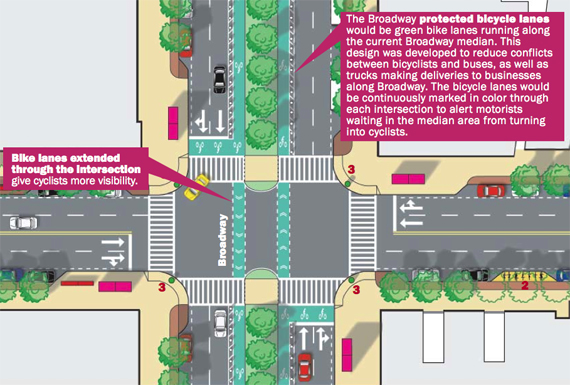The public will hear from DOT next week at a Community Board 7 meeting on proposed improvements at Broadway and 96th Street, after three pedestrians were fatally struck by drivers at or near the intersection this month.
"Safety is our top priority and we are actively identifying and evaluating a range of options for the area," said DOT spokesperson Scott Gastel in an email. "As we mentioned last week, we are developing a proposal with pedestrian safety enhancements for the intersection of West 96th Street and Broadway, and will present it to Community Board 7 as soon as possible."
The last major change to this stretch of Broadway came when DOT hacked away nine feet of sidewalk as part of a project that added a new subway entrance in the middle of the street. Clarence Eckerson and Streetsblog Publisher Mark Gorton interviewed pedestrians about crowded conditions on Broadway for Streetfilms when that plan was revealed in 2006, when Iris Weinshall was DOT commissioner.
There were 73 pedestrian and cyclist injuries at Broadway and 96th between 1995 and 2009, according to Transportation Alternatives' CrashStat. NYPD data mapped by NYC Crashmapper showed 72 crashes there from August of 2011 through October 2013, an average of 2.67 crashes per month. Eight pedestrians and four vehicle occupants were injured at the intersection during that period.
The area got the attention of Mayor Bill de Blasio and NYPD Commissioner Bill Bratton when a spate of crashes resulted in the deaths of pedestrians Alexander Shear, Samantha Lee, and Cooper Stock. Shear was struck by an MTA bus driver at Broadway and 96th; Lee was hit by an ambulance driver on 96th between Broadway and West End Avenue; and 9-year-old Stock and his father were run over by a cab driver at West End Avenue and 97th Street.
Residents and electeds last week demanded safer streets at a vigil for Stock and Shear. Unfortunately, the city's response to this point has been to focus on the behavior of those who are being injured and killed. At a CompStat meeting this morning, Bratton again praised the 24th precinct for "taking action" and doing an "excellent job" by ticketing pedestrians at Broadway and 96th. De Blasio made similar comments after the precinct summonsed 18 pedestrians and five motorists last weekend, when a senior ended up bloodied and criminally charged after he was stopped by police for crossing against the signal.
"It will take time to fix that very dangerous intersection," Bratton said, according to the NYPD Twitter feed.
In 2008, the Upper West Side Streets Renaissance Campaign composed the "Blueprint for the Upper West Side: A Roadmap for Truly Livable Streets," a 51-page plan for improving neighborhood streets for walking and biking. The document was produced in consultation with Jan Gehl and Donald Shoup, and drew on concepts already in use by DOT.

Said Thomas DeVito, T.A. Manhattan organizer, in an emailed statement to Streetsblog:
"It's encouraging to see that CB7 and DOT are being responsive in the wake of these tragedies. If anything has been made clear, it's that the community itself has a lot to say about 96th Street and other dangerous corridors in the district. Hopefully the one silver lining that can emerge from these painful incidents is a reinvigorated, pro-active approach to pedestrian and cycling safety issues. The time has come for leadership at both the city and community level to emphasize -- and prioritize -- the safety of our streets most vulnerable users."
Next week's meeting [PDF] will be held on Thursday, January 30, at Goddard Riverside Community Center, 593 Columbus Avenue at W. 88th Street, at 6 p.m.





